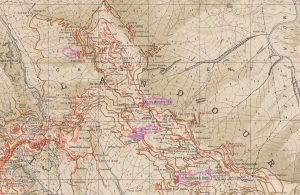“… I’ve decided to live in this passage for a season. Although they are almost exactly the same, Micah has an entire verse which Isaiah excludes: Everyone will sit under their own vine and under their own fig-tree, and no-one will make them afraid, for the Lord Almighty has spoken (Micah 4.4).Sitting under my own vine, my own fig tree. What a picture this is—of a personal, familial and vocational fearlessness because the word of God has spoken. It is a picture that grows faint and dim in a pandemic. But as is always the case in times of trouble, the solution is found in walking with God, which is where Micah travels in the next verse: All the nations may walk in the name of their gods; we will walk in the name of the Lord our God for ever and ever (Micah 4.5).The word of God and the walk with God…”
“Warm greetings from Zahle! Thank you so very much for sharing these thoughts. You made my day by bringing to my mind such fond memories …When I was a child we did not only sit under our vine, we slept under it for many nights. Summer is a hot season in the Middle East. It was such a refreshing time to sleep under the vine after having a simple meal of bread, white cheese, olives and fresh grapes from the vine! My grandparents had such a wonderful vine covering their entire roof. Every winter I looked forward to the time when it will be possible to sleep under the vine … I did that for over 13 years.Even now in our small garden in Zahle we have five vines and a fig tree and whenever I prune them, pick up their fruit, or even pass by them I recall Micah 4.4. In the midst of what is going on in Lebanon, Syria, Palestine and the whole region we look forward for the time when we will be able to sit under the vine and the fig tree. Blessings and peace!”
“In the musical Hamilton, (Micah 4.4) is what George Washington sings to his secretary, Alexander Hamilton, when he is explaining why he must retire. It is a beautiful moment in the show. And this performance here is especially moving because the cast and band sing it to President Obama in the White House just before he leaves…”
About Me

the art of unpacking
After a childhood in India, a theological training in the USA and a pastoral ministry in Southland (New Zealand), I spent twenty years in theological education in New Zealand — first at Laidlaw College and then at Carey Baptist College, where I served as principal. In 2009 I began working with Langham Partnership and since 2013 I have been the Programme Director (Langham Preaching). Through it all I've cherished the experience of the 'gracious hand of God upon me' and I've relished the opportunity to 'unpack', or exegete, all that I encounter in my walk through life with Jesus.
Recent Posts
Football helps me train preachers. See, when you speak to me about football—or, ‘footie’—I need to know where your feet are before I can understand what you mean. Are your feet in Ireland, or Brazil, or the USA, or NZ—or in crazy Australia? It must be the most fanatical sporting nation in the world. Within…
Having been born in 1959, I don’t remember much about the 1960s. But I have heard a lot. Hippies. Drugs. Rock ‘n Roll. Assassinations. Moon-walking. A quick trip across to ChatGPT informs me immediately that it was ‘a transformative decade across the world’—marked by the civil rights and feminist movements, Cold War tensions, consumerism and…










Interesting! I read the quarterly-ish magazines of Manna Gum in Australia, an organisation thinking about how to live Christianly in economic/material life. They quote the idea of the 'vine and fig tree' all the time – generally in terms of God providing what we need for rich lives, so we don't need to grasp for everything. I'm pretty sure the key people in Manna Gum have Anabaptist connections, which would link them to aspects of the US church. We also have neighbours who met through Mennonite missions, and they quote it often also. Like your Lebanese friend, I am blessed with a garden with a vine and a fig tree (both currently nearing harvest!) and looking at them reassures me as those words often echo in my head 🙂
Never heard of Manna Gum. I shall explore, Heather!
I also have a fig tree — and a vine flowing across form the neighbour — but neither seem to be in as good condition as yours, or my friend in Lebanon.
Warm greetings
Paul